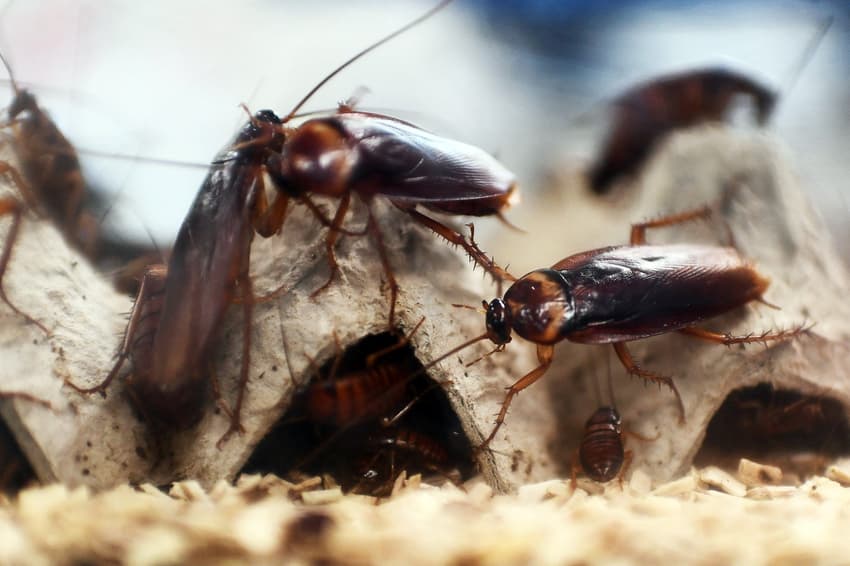'Mutant cockroaches': Why Spain's rising temperatures make them multiply

Experts in Spain are warning that rising temperatures are causing genetic mutations in cockroach populations that lengthen their breeding seasons and make them more resistant to traditional pesticides.
They're a part of Spanish summers that everyone dreads. No, not the blistering heat or beaches and beauty spots teeming with tourists, but the cockroaches coming out of hibernation.
If you haven't lived in a warm climate before, this can come as a bit of a shock. This is especially true if you come across some of the huge, brown cockroaches scurrying across the street or, even worse, in your house.
But now climate and pest control experts warn that climate change could make the problem even worse by causing a genetic mutation and creating what the Spanish press have dubbed 'mutant cockroaches' (cucarachas mutantes) that are growing immune to traditional pesticides.
READ ALSO: What to do about insects and other pests in your home in Spain?
The mutation, experts fear, combined with longer breeding seasons and increased birth rates, could pose a public health risk.
Rising temperatures are causing the 'blond' or Germanic cockroach (blattella germanica) to genetically mutate.
"Their metabolic cycle is accelerated" by the heat and they are increasingly immune to insecticides, Jorge Galván, director general of the National Association of Environmental Health Companies (Anecpla), told Spanish news outlet 20minutos.
Climate change has changed Spain from "subtropical to a tropical climate," Galván says.
"The warm seasons are getting longer and the cold ones are getting hotter." This in turn means that cockroaches appear "a couple of months earlier" and stay out later into the year than they previously would.
This means a longer breeding season, and therefore a larger number of cockroaches.
The effects of these high temperatures combined with longer breeding seasons substantially increases "the probability of a genetic alteration.” Already, pest control experts have seen that cockroaches are becoming immune to traditional pesticides and can ingest chemicals previously used to kill them, something that will, Galván fears, contribute to problems not only of pest control "but of public health."
READ ALSO: What venomous species are there in Spain?
Carlos Pradera, technical manager of the pest control company Anticimex, explained that "the more we treat them, the more they withstand the pressure."
For this reason, Pradera says, experts are investigating other "preventive measures" to try and combat the genetic changes, looking at other "other methodologies based on traps and vacuums."
Cockroaches are becoming increasingly common in homes and bars and restaurants in Spain, experts warn. Anticimex carried out almost 40 percent more pest control incidents in 2023 than the previous year, a record, according to data provided to EL PERIÓDICO.
Comments
See Also
They're a part of Spanish summers that everyone dreads. No, not the blistering heat or beaches and beauty spots teeming with tourists, but the cockroaches coming out of hibernation.
If you haven't lived in a warm climate before, this can come as a bit of a shock. This is especially true if you come across some of the huge, brown cockroaches scurrying across the street or, even worse, in your house.
But now climate and pest control experts warn that climate change could make the problem even worse by causing a genetic mutation and creating what the Spanish press have dubbed 'mutant cockroaches' (cucarachas mutantes) that are growing immune to traditional pesticides.
READ ALSO: What to do about insects and other pests in your home in Spain?
The mutation, experts fear, combined with longer breeding seasons and increased birth rates, could pose a public health risk.
Rising temperatures are causing the 'blond' or Germanic cockroach (blattella germanica) to genetically mutate.
"Their metabolic cycle is accelerated" by the heat and they are increasingly immune to insecticides, Jorge Galván, director general of the National Association of Environmental Health Companies (Anecpla), told Spanish news outlet 20minutos.
Climate change has changed Spain from "subtropical to a tropical climate," Galván says.
"The warm seasons are getting longer and the cold ones are getting hotter." This in turn means that cockroaches appear "a couple of months earlier" and stay out later into the year than they previously would.
This means a longer breeding season, and therefore a larger number of cockroaches.
The effects of these high temperatures combined with longer breeding seasons substantially increases "the probability of a genetic alteration.” Already, pest control experts have seen that cockroaches are becoming immune to traditional pesticides and can ingest chemicals previously used to kill them, something that will, Galván fears, contribute to problems not only of pest control "but of public health."
READ ALSO: What venomous species are there in Spain?
Carlos Pradera, technical manager of the pest control company Anticimex, explained that "the more we treat them, the more they withstand the pressure."
For this reason, Pradera says, experts are investigating other "preventive measures" to try and combat the genetic changes, looking at other "other methodologies based on traps and vacuums."
Cockroaches are becoming increasingly common in homes and bars and restaurants in Spain, experts warn. Anticimex carried out almost 40 percent more pest control incidents in 2023 than the previous year, a record, according to data provided to EL PERIÓDICO.
Join the conversation in our comments section below. Share your own views and experience and if you have a question or suggestion for our journalists then email us at [email protected].
Please keep comments civil, constructive and on topic – and make sure to read our terms of use before getting involved.
Please log in here to leave a comment.